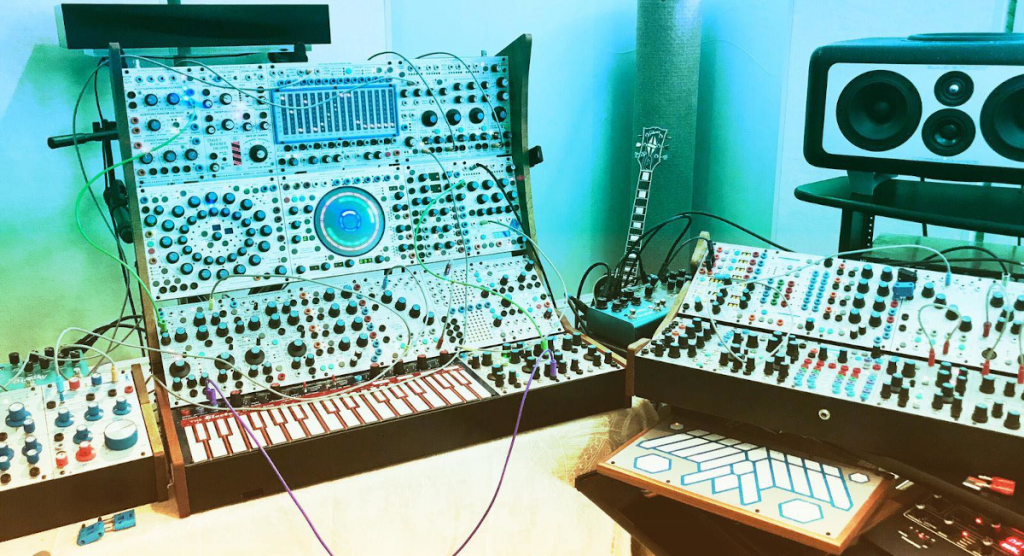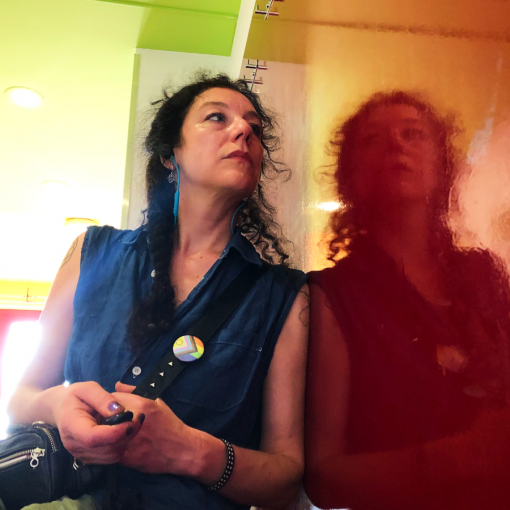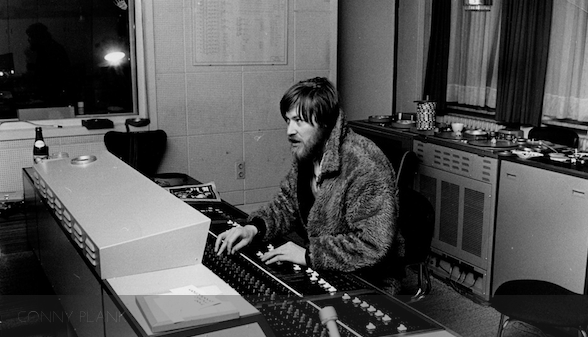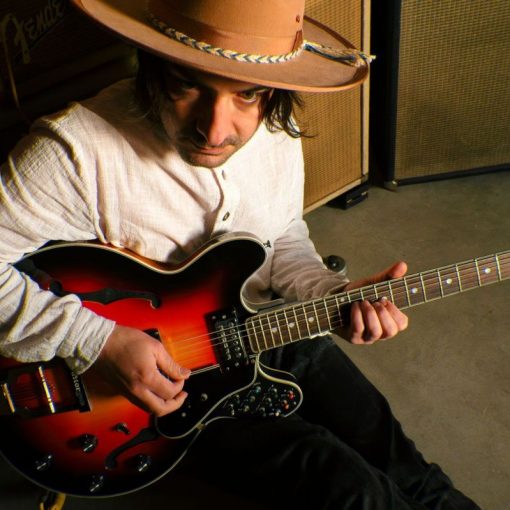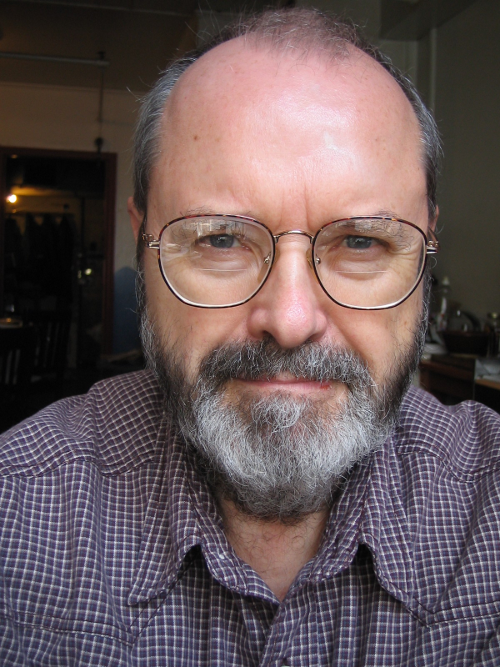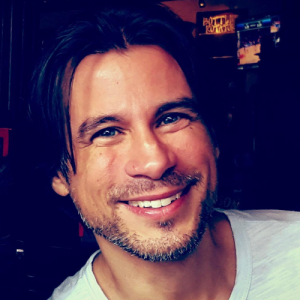 Kevin Rix is perhaps best known for his work in Hollywood as composer at Paul Dinletir‘s Audiomachine production company, where he has been responsible for the trailer music for films such as Avatar, How To Train Your Dragon and many more.
Kevin Rix is perhaps best known for his work in Hollywood as composer at Paul Dinletir‘s Audiomachine production company, where he has been responsible for the trailer music for films such as Avatar, How To Train Your Dragon and many more.
A relatively recent convert to the form after coming from a rock background and the brief but epic sound of cinematic trailers, Kevin has released five solo albums of modular synth music to date. As part of the ongoing collaboration with Philippe Petit‘s Modulisme sessions. Freq caught up with him about how he became entangled into the world of Buchla synths and beyond.
When did you first become aware of modular synthesis as a particular way of making music, whether as part of electronic music in general or more specifically as its own particular format, and what did you think of it at the time?
I’ve known about modular since I first saw pictures of Trent Reznor and Junkie XL’s studios, but I was very intimidated by it for a long time. But about five years ago, a dear friend and colleague called me and said “You have to go to this store called Perfect Circuit. It will change your life!” He was not wrong, and I look back on that day as both a blessing and curse. 🙂What was your first module or system?
Make Noise.
How long did it take for you to become accustomed to patching your own synthesizer together out of its component parts?
About six months to learn the method and about two years for it to become comfortable. I’m guessing it will take the rest of my life to find the hint of something that resembles true mastery.Do you prefer single-maker systems (for example, Buchla, Make Noise, Erica Synths, Roland, etc) or making your own modular synthesizer out of individual components form whatever manufacturer that match your needs.
I prefer single-maker systems and particularly love Buchla.
East Coast, West Coast or No-Coast (as Make Noise put it)? Or is it all irrelevant to how you approach synthesis?
I tried to explain to a colleague the difference between East and West Coast synthesis, but he quickly got bored and said, “Please stop, I don’t care, I thought you were going to tell me a story about a hip-hop war.” Personally, I think the Buchla is the best synth ever designed, and I want to focus all of my attention on what that philosophy has to offer. We’ve heard plenty of East Coast throughout our lives on the radio and on our favorite records, and I want to explore what has not been heard yet. That said, when I write music for commerce I tend to use East Coast, because it blends well with an orchestra and other instruments.Do you tend to use pure modular systems, or do you bring in outside effect and devices when playing or recording?
I like using delay and reverb. Buchla is kinda lacking in that department, and most of those modules are rare and difficult to find, so I use guitar pedals to get the expansive sound I want. I also use a Bricasti M7 to put the entire sound in a beautiful concert hall. Interestingly, I think Eurorack sounds like shit with expensive reverbs, whereas Buchla does not.Do you find that you record straight with no overdubbing, or do you end up multi-tracking and editing tracks in post-production?
When I started, I tried to do as much live recording as possible, but would sometimes end up editing and adding a few overdubs. Uncivilized and Possible Responses were done that way. When I bought the Skylab, I wanted to explore continuous unedited takes. I would patch, rehearse once or twice, then hit record. That ended up being Lalikins Books 1 and 2. Most of those tracks were recorded to an unedited stereo file in Cubase, then sent directly to a mastering engineer. Now I do everything in one continuous improvised take.
I think Buchla was designed to explore the unexpected, so it feels wrong for me to patch, rehearse, record, edit and mix. I spend every day of my life composing on the DAW for my work. That process is very tedious until the very end when it all comes together, and I don’t have the energy or desire to duplicate that process with my modular experience. That being said, my composing process has recently been “do whatever the fuck sounds good”, so I’m trying not to have any particular dogma and aiming to stay open to all processes.
Do you pre-patch your system when playing live, or do you tend to improvise on the spot?
I have no interest in performing live in front of people. I do post my Buchla performances to YouTube for anyone who is interested, but that’s about as far as it goes. Happily, the market is already flooded with many talented modular artists, so there are plenty of options for people who want to watch live performances.
Which module could you not do without, or which module do you you use the most in every patch?
The 259e. I love the entire system.
What do you think that can only be achieved by modular synthesis that other forms of electronic music cannot or makes harder to do?
That’s a difficult question. I approach the modular with a completely different approach than I do when composing on the DAW. The DAW is a more controlled environment to fully realise a composition and production, whereas the modular is all about exploration and discovery. I get so bored when I see modular folks trying to duplicate their favorite band or whatever on their modular rig. One technique that is difficult to emulate in the DAW is the ability to patch everything into itself. It’s a piece of cake on modular 🙂Have you used various forms of software modular (eg Reaktor Blocks, Softube Modular, VCVRack) or digital hardware with modular software editors (eg Nord Modular, Axoloti, Organelle), and if so what do you think of them?
I’ve used Reaktor extensively throughout my career. My favorite software synth is Zebra 2.8. I can bring out a little Buchla flavour with that since they introduced the wavefolder.
What module or system you wish you had?
I’m looking forward to getting some of those Verbos-cloned Buchla modules. I’m a huge fan of his Eurorack system and would like to have some of those modules in the Buchla format.
Have you ever built a DIY module, or would you consider doing so?
No and no.
Which modular artist has influenced you the most in your own music?
Recently, Todd Barton and Philippe Petit. Both artists are fearless, passionate, and truly understand the philosophy behind Buchla. I love when they release new material as it’s always a journey into the unexpected.Can you hear the sound of individual modules when listening to music since you’ve been part of the modular world — how has it affected (or not) the way that you listen to music?
Sadly, yes. I kinda wrestle with the idea of overanalysing music. I try to listen to music emotionally and not technically. For instance, my favorite rock band is Tool. When they released their first record in thirteen years, I made sure that each listening session was in a controlled environment with zero distractions. I wanted to fully experience that album as many times as I could as a fan of their art. It was amazing! An incredible journey listening to the entire album as a whole. Then one day in the studio when practising my guitar, I randomly started playing one of the riffs and thought, “fuck!!!”. I was bummed because I knew at that moment I was leaving the wonderment phase and entering the analysis phase of enjoying that album. Now it’s a conscious effort to forget the notes they’re playing and listen to it emotionally. I struggle with the same thing when listening to modular work.
What have you been working on lately, and do you have any upcoming releases or performances?
I have a single called “Mercuria” coming out in June. It was created with the Verbos Electronics system and a Virus TI2 synth. I’ve also been working on pieces across many different styles during this Covid lockdown. I have a dedicated YouTube channel for my artist pieces and I try to release something every week or two.Philippe asked me to contribute, so I went down to the studio, put on a timer, hit record, and started patching and performing. At the time, I had just started my journey into the “patch from scratch” method of recording and thought it could fit well into Philippe’s wonderfully-curated world of Modulisme, rather than a fully produced, edited, overdubbed and mixed piece. I was a little nervous when I submitted the track as I’ve never done anything like that before, but he ended up liking it and encouraged me to keep recording that way.
Who would your dream collaborator be for a Modulisme session or otherwise?
Todd Barton, Philippe Petit, Bana Haffar, Rodent. One can dream. 🙂*
- Audiomachine‘s website
- Kevin Rix’s YouTube channel
- Bandcamp
- Modulisme.

